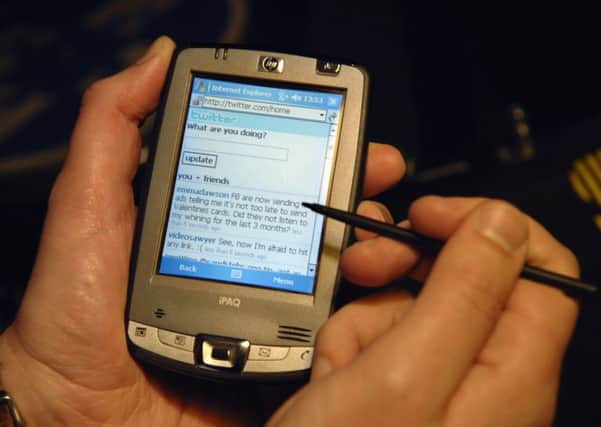Twitter users vote on words for Collins dictionary


For now terms such as “nomakeupselfie” and “fracktivist” - an environmentalist who campaigns against the practice of fracking - which have mainly been confined to use on social media sites are to be voted on and could fall into common useage.
Collins English Dictionary has pinpointed nine words which have come into being on sites like Twitter and Facebook.
Advertisement
Hide AdAdvertisement
Hide AdNow Twitter users are being asked to vote for which one they think should be included in this year’s edition of the dictionary.
“Nomakeupselfie” shot up the rankings of online useage last month when women across the world began posting pictures of themselves without make-up to raise money for cancer charities.
Two other words related to the practice of taking a “selfie” - posing for a picture using a person’s own smartphone or tablet - appeared in the form of “felfie”, meaning a selfie taken by a farmer with his livestock and “duckface”, which is the pout usually adopted by those posing for selfies.
Also on the list is “gaybourhood” - a gay friendly neighbourhood -and “adorkable”, meaning someone who is both dorky and adorable.
A “fatberg” - a large mass of solid waste or grease which clogs a sewage system - made up the remainder of the chosen words, along with “Euromaidan” - the original pro-Europe protests in Ukraine, named for Maidan Square in Kiev - and “vaguebooking”, which is defined as the practice of posting vague social media updates with the intention of prompting a response.
Ian Brookes, lexicographer and consultant editor to the Collins English Dictionary, said the words had all been submitted for inclusion by social media users via the organisation’s website and had then been analysed by the “Collins corpus”, which records word usage around the world in newspapers, magazines, TV, radio and online.
“They are all ‘bubbling under’ words in that we would not usually put them in the dictionary at this stage as they have not reached the required level of usage,” said Mr Brookes.
“However, when we additionally used Twitter data to look at their profile it was clear that there was a definite pattern of use on Twitter and we could see where they originated from, and how their use has grown and spread geographically.
Advertisement
Hide AdAdvertisement
Hide Ad“In this way, we are harnessing Twitter data to detect and track word development at an early stage. We are asking Twitter users to comment on which of the words they commonly use, and are therefore worthy of entering the dictionary.”
Lucy Mangan, who blogs on collinsdictionary.com and is a contributor to the Collins English Dictionary said: “Twitter is the perfect place to find out what people are really saying and how they’re saying it. It’s a space in which you’re freer than almost anywhere else to combine old words, resurrect others or invent totally new ones whenever the need arises.”
Until midnight on 28 May, Twitter users can vote on the shortlist of new words at http://twictionary.collinsdictionary.com/. The winning word will be announced in June and will go into the new edition of the Collins English Dictionary, publishing in October 2014.